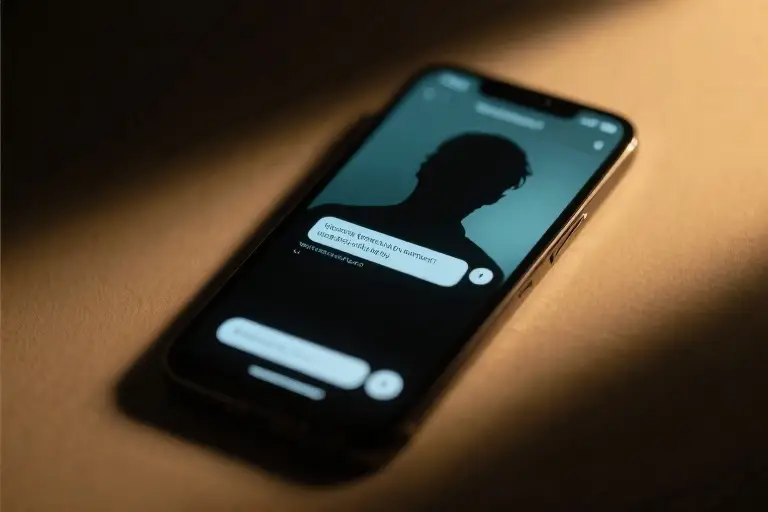You’ve seen that notification before—the one that says ‘read’ but never gets a reply. And like so many of us, you’ve whispered those words to yourself in the quiet hours: If they wanted to, they would. It feels like armor, this phrase. A way to simplify the messy arithmetic of human connection into something binary, something manageable.
But hearts don’t work like toggle switches. Desire isn’t a currency we can spend at will. There are people who carry love like a secret they’re afraid to pronounce, hands shaking too hard to hit ‘send.’ People who draft messages at 3 a.m. only to delete them by daylight. People who want to stay but have forgotten how to inhabit the same room as their own longing.
We mistake absence for indifference when often it’s just the opposite—a presence too overwhelming to name. The colleague who remembers your coffee order but never asks you to lunch. The friend who texts thinking of you during your loss but avoids the funeral. The lover who pulls you close in darkness but flinches at daylight. These aren’t contradictions; they’re the hieroglyphics of a language we’re all still learning.
Timing too plays its cruel jokes. Two people can want the same thing with equal ferocity and still miss each other by years—one finally ready to build just as the other starts needing space to breathe. We call this ‘mixed signals’ when really it’s just the static of two different songs playing at once.
And then there’s the weight no one talks about: the terror of being wanted. How the warmth of another’s gaze can feel like standing too close to a fire after years in the cold. How ‘I love you’ sounds like both salvation and sentence. Some departures aren’t rejections—they’re retreats from a light that feels too bright to bear.
So no, it’s not always as simple as if they wanted to, they would. Sometimes wanting is the easy part. The hard part is believing you won’t break what you touch, that you deserve to keep what you love, that the world won’t punish you for trying. These silences aren’t empty. They’re full of all the words that couldn’t find their way out.
The Gap Between Wanting and Doing
We’ve all heard it before – that sharp little phrase tossed around like a universal truth. “If they wanted to, they would.” It sounds so clean, so decisive, like a knife cutting through the messy ambiguity of human relationships. But love and desire don’t operate on simple mechanics. Wanting something doesn’t automatically translate into being able to reach for it.
Fear weighs heavier than we admit. Not the dramatic kind from movies, but the quiet tremors that make hands shake when they try to hold something precious. The fear of being too much, or not enough. The fear of repeating old wounds or creating new ones. Some people stand at the edge of connection, their desire to step forward perfectly balanced by their terror of falling.
Timing betrays us more often than we acknowledge. External pressures – career transitions, family obligations, personal crises – create invisible barriers even when hearts lean toward each other. Two people can want the same thing desperately while life arranges itself to keep them apart. The right person at the wrong time isn’t just a cliché; it’s a particular kind of heartbreak that no amount of wanting can overcome.
Past trauma builds walls that present desire can’t always scale. Those with avoidant attachment patterns often experience this most acutely – they might crave intimacy while simultaneously fearing it, drawn toward warmth yet conditioned to associate closeness with danger. The childhood wounds that taught them to survive by retreating don’t disappear just because they meet someone worth staying for. Healing moves at its own pace, sometimes too slowly for love’s timeline.
This isn’t about making excuses for poor behavior. Some people truly don’t care enough to try. But many others care deeply yet find themselves paralyzed – not by indifference, but by the overwhelming intersection of history, circumstance, and the terrifying vulnerability that real connection requires. Their silence isn’t always absence; sometimes it’s the loudest scream they can manage.
We do ourselves a disservice by reducing complex human emotions to binary equations. Between “wanting” and “doing” stretches a vast landscape of psychological and situational barriers. Recognizing this doesn’t mean settling for less than we deserve; it means understanding that another person’s limitations often have nothing to do with our worth, and everything to do with their own unfinished battles.
The Silent Language of Love
Some people love like thunderstorms – loud, impossible to ignore, drenching everything in their path with unmistakable presence. They text good morning before your alarm goes off, plan anniversary surprises months in advance, and say “I love you” with the ease of someone ordering coffee. This is love that announces itself, that leaves receipts.
Then there are those who love like morning fog – present but shifting, visible yet untouchable. You sense them more than see them: the text that arrives exactly when you needed it but three days after your last message, the hand that almost reaches for yours then retreats, the vulnerability offered then quickly masked with humor. Their care comes in Morse code, a pattern of presence and absence that leaves you deciphering.
The fog-lovers aren’t playing games. They’re speaking the only dialect they know, one shaped by childhoods where affection came with conditions, by past relationships where vulnerability was weaponized. Their love exists in the hesitations:
- The “I’m busy” that really means “I’m scared this matters too much”
- The canceled plans that hide “I don’t trust myself not to disappoint you”
- The silent treatment that whispers “I need you to prove you’ll stay”
We mistake this language for indifference because we’ve been taught love should be effortless. But consider: isn’t the person who shows up despite terror more courageous than the one who loves without fear? The trembling hand reaching out contains more willpower than the steady one.
Yet this creates terrible asymmetry in relationships. The thunderstorm lover interprets fog behavior through their own dictionary: “If they cared, they’d…” fill in the blank with whatever comes easily to them. But what if we asked instead: “How does care look when spoken by someone who associates love with danger?”
Here’s how to read the fog:
- Watch for micro-moments – The text asking about your job interview, the remembered allergy when ordering takeout. These are their love letters.
- Notice protective gestures – The way they steer you away from the curb, the extra blanket left on your side of the bed. Safety is their love language.
- Decode distancing – When they vanish after intimacy or sabotage happy moments, it’s often panic, not rejection. The part that wants closeness is fighting the part that remembers pain.
The cruel irony? Those most desperate for connection often have the worst reflexes for maintaining it. Their survival instincts – honed in different emotional climates – misfire in healthy relationships. Like someone who learned to swim in stormy seas now drowning in calm waters.
This doesn’t mean tolerating emotional unavailability. Some fog never lifts, and you’re not required to live in the mist. But understanding there are entire lexicons of love beyond the obvious declarations? That changes everything. The next time someone’s care confuses you, ask not “Do they love me?” but “In what dialect is their love written?” The answer might surprise you.
Moving Beyond Self-Blame
The hardest part isn’t the leaving. It’s the quiet hours afterward when your mind replays every moment, searching for clues you must have missed. We dissect texts for hidden meanings, analyze silences as if they were crime scenes, and ultimately point the finger at ourselves: If only I’d been more/less… they would’ve stayed.
But what if the equation isn’t that simple?
The Three-Step Detangler
1. Map the evidence, not the assumptions
Create two columns on paper or in your notes:
- Demonstrated Care: Concrete actions showing investment (e.g., remembering small details, initiating contact during tough times)
- Demonstrated Limitations: Clear patterns of withdrawal (e.g., avoiding vulnerability talks, hot-and-cold behavior)
This isn’t about tallying “wins” and “losses.” It’s about separating their capacity to love from your worthiness of love—two things our pain often conflates.
2. Rewrite the unsent story
Grab a notebook and complete this sentence: “If they’d been able to love the way I needed, it might have looked like…” Describe specific scenes—Sunday morning rituals, how they’d handle your tears, the texture of everyday commitment.
This exercise does something remarkable: it shifts the narrative from “Why wasn’t I enough?” to “This is what available love actually requires.” You’re not fantasizing; you’re defining realistic emotional standards.
3. Redirect the energy inward
For every hour spent analyzing their mixed signals, invest equal time answering:
- What did this experience teach me about my non-negotiables?
- How can I comfort the part of me that feels abandoned?
- What boundaries will serve me better next time?
When Professional Help Makes Sense
Consider therapy if:
- You notice a recurring pattern (e.g., always choosing emotionally unavailable partners)
- Self-blame persists despite logical understanding
- The rumination interferes with daily functioning
Books like Attached by Amir Levine explain the science behind why some relationships feel like pushing a boulder uphill, while others flow like rivers. Sometimes understanding the why behind human behavior is the first step toward releasing the what ifs.
The Liberating Truth
Some loves are bridges to our deeper selves rather than destinations. Their purpose isn’t to stay, but to show us where we still tremble at the edge of our own worthiness.
That person who left? They weren’t your failure—they were your mirror. And now you get to decide what the reflection teaches you about the love you’ll both give and accept next time.
When Love Doesn’t Look Like Love
We’ve all held that phrase close at some point – “If they wanted to, they would” – like a compass pointing toward painful truth. But what if we’ve been reading the map wrong all along? What if love sometimes wears disguises so convincing even the person feeling it doesn’t recognize themselves?
Consider the quiet ways care manifests when fear gets in the way:
The text drafted at 2am but never sent.
The hand that reaches out halfway then retreats.
The name typed into search bars but never spoken aloud.
The distance between wanting and doing stretches wider when someone’s carrying invisible weights – childhood wounds that taught them love always leaves, anxiety that whispers “you’ll ruin this too”, or simply not having learned how to receive good things without suspicion.
Attachment theory shows us these patterns aren’t about you. An avoidant person’s withdrawal isn’t a verdict on your worth. An anxious person’s clinging isn’t proof you’re failing them. These are old survival strategies misfiring in new relationships, like immune systems attacking harmless pollen.
Some hearts communicate in Morse code – bursts of connection followed by silence that doesn’t mean absence. Others build elaborate defenses around something tender, not realizing the fortifications keep out joy as effectively as pain. The tragedy isn’t that these people don’t care. It’s that they care so much it terrifies them.
Healing begins when we stop interpreting every retreat as rejection. When we understand that sometimes love stays quiet not from lack, but from having been punished for speaking up before. That “I can’t” often means “I don’t know how” rather than “I won’t.”
This doesn’t mean tolerating breadcrumbing or emotional unavailability. Healthy boundaries still matter. But compassion allows us to set those boundaries without needing to villainize the other person – or ourselves. Some connections fail not because either person was lacking, but because their wounds spoke different languages.
So the next time you’re tempted to declare “If they wanted to, they would,” try adding three quiet words: “…in their way.” Not as excuse, but as acknowledgment that courage wears many disguises, and love – real, messy, human love – often looks nothing like we expect.
What’s your experience with love that didn’t follow the script? Share in the comments – the stories we tell each other might be the maps someone desperately needs.





